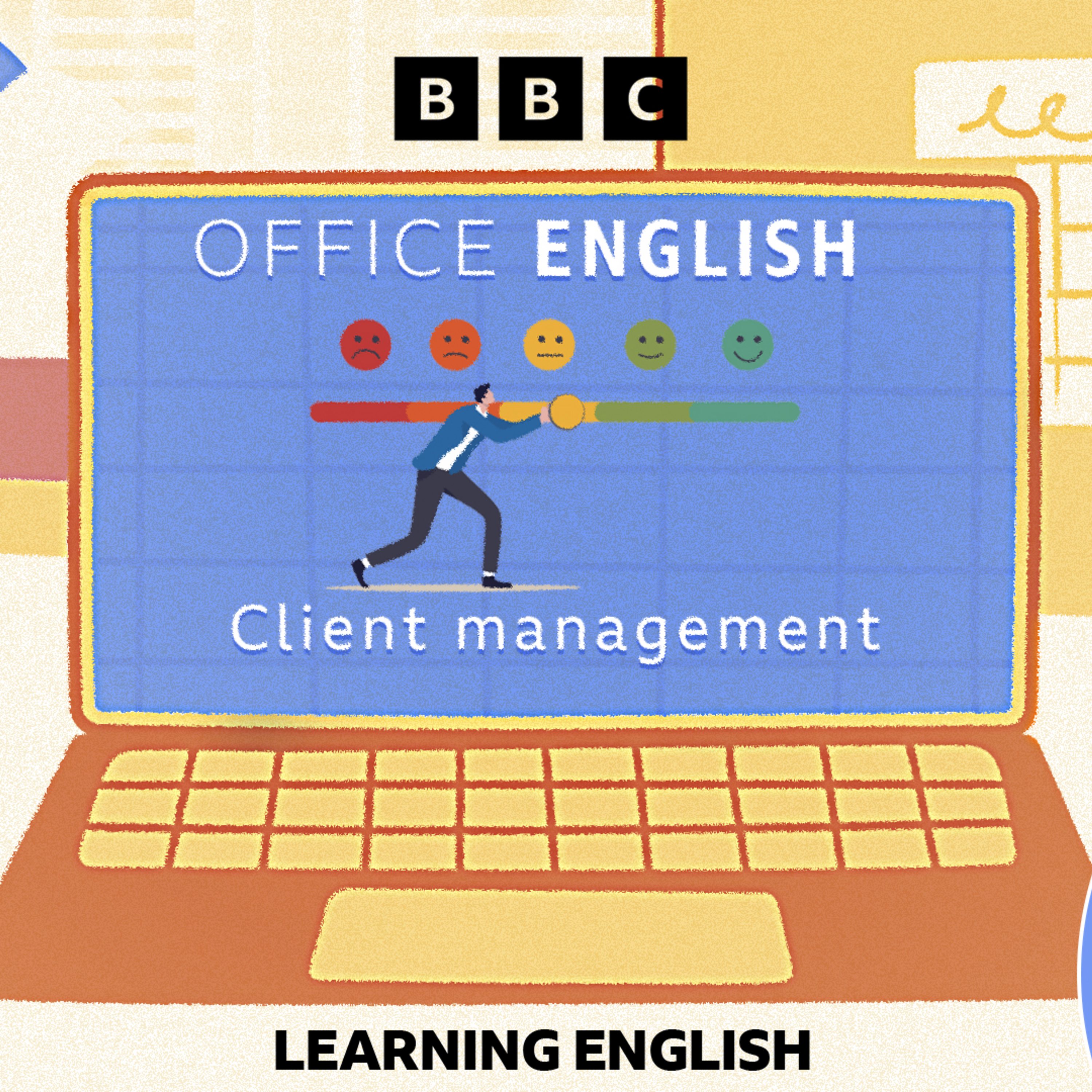
Office English: Client management

Learning English For Work
Deep Dive
- Honesty and proactive communication are crucial for maintaining client satisfaction.
- Tailoring services to client needs and actively listening to their wants are essential.
- Regular check-ins and progress updates help keep clients informed and prevent surprises.
- Clearly explaining work processes helps avoid future conflicts.
Shownotes Transcript
Hello. Want to improve your pronunciation? Our new video series, The Pronunciation Lounge, helps you hear, recognise and produce English sounds, words and phrases. Find all the episodes on our website and practise your listening and speaking skills. Visit bbclearningenglish.com. How do you deal with clients and customers at work? I think the main thing is to be very honest with them.
communicate if there's any problems, let them know straight away so you're not suddenly springing a surprise on them. I think trying to tailor something to the customer's needs always works quite well. Listening to what the customer wants and then trying to deliver that. In today's episode of Office English, we're talking about how to keep customers happy and deal with difficult clients.
Hello and welcome to Office English, the podcast for improving your English at work. I'm Phil. And I'm Pippa. You can find a transcript for this episode to read along on our website, bbclearningenglish.com. Pippa, we heard at the start of the programme from some colleagues about how they try to keep customers and clients happy. What do we mean by customers or clients?
Well, customers are people who buy things from your business. So this could be the public or it could be other businesses. And client is kind of another word for customer. But we usually use this to talk about people or businesses that you provide a service for rather than selling them a physical item. In many workplaces, you'll hear the phrase client management often.
This just means making sure that the people you're providing work for are satisfied. And it can be quite tricky. Yes. So in today's episode, we're going to talk about how we can communicate with clients and keep them happy. OK, Pippa, let's imagine that you work at a company that has a big new client and lots of new work. Your boss puts you in charge of managing the client.
So Phil, the first thing I do is try to establish what this client wants. What are their expectations of their relationship with my company? So I might ask something like, what does a successful partnership look like for you? Or I might ask, what can we do to make sure things run smoothly on your side? And on your side just means from your perspective. Yeah, and you might want to check your plans with them. So we're going to ask you, what do you think?
We're looking to deliver the first part of the project to you by the end of the month. Is that in line with your expectations? You could say expectations is what the client wants to happen. And in line with it means whether you meet that or not. Yeah. Another way you could phrase this is saying we usually allocate a week to make improvements based on client feedback. Will that work on your end? And again, on your end just means will that work for you?
So explaining the way you work can be really useful because it avoids conflicts further down the line in case maybe the client thought you could be quicker or do something in a different way. Yeah, and what's really important is just to keep communicating. So maybe check in with your clients. You might want to have regular catch-ups to just check on progress.
What's really important is that if there are any problems or any delays, that you're able to flag those up very quickly with your client so that there aren't any bad surprises down the line. Now, sometimes a client or customer might be unhappy about the work you or your company has done. So how can you deal with this, Phil, and stay professional?
OK, well, I think, again, the most important thing is to go back to what does the client want? So you could say to them, I'm sorry we didn't meet your expectations. What can we improve on to get this right? How can things work better for you?
Yes, I think that's important because you need to understand what they want from you. You don't want to get defensive. You need to understand why they think what you've done is wrong. You can also reassure them so you can tell them, we'll be sure to avoid this problem in the future or I've shared your feedback with the team and rest assured this won't happen again. Rest assured just means be sure.
Sometimes you might feel like your client has unrealistic expectations. Maybe they give you deadlines that are too tight, or they ask for lots of changes to your work that you don't agree with.
What can you do? Well, it's tricky because usually the client is paying you. So you have to balance keeping them happy with making sure that you're not wasting time or doing more work than the job is worth. You have to always keep them happy, but you also have to do your job and you have other clients. What actually can be really important here is to try and identify what the actual priorities are that your clients have, because it may be that
You can find a compromise, that's an agreement that's different to what you originally said, that they're happy with because it meets what their priorities are, whether it's they just need something that's ready on time or whether the deadlines aren't actually as strict as they said, but the quality standard absolutely has to be there. Finding their priorities can help you come to an agreement. Yeah, it's all about balance and compromise. So let's listen to our colleagues Sian and George again.
I think just trying to explain what the situation is and try and give them some realistic expectations. See it from their point of view, I guess, because...
It may seem unrealistic to us, but for them, it obviously does seem realistic. Yeah, just be patient, I think. So Sian mentioned the importance of communication, even if you think a client is being unreasonable. So you can try and agree a particular way of working. So you could say something like, I just want to be sure we're on the same page or I want to make sure our processes are aligned. What's your preferred way of working on this? And that's a bit like what you mentioned earlier.
about priorities, Phil. You need to understand how they are expecting you to work. Yeah, and sometimes you might need to talk to your boss about a client, particularly if something's gone a little bit wrong, but do try to remain professional rather than moaning. So you might say, can I flag a problem with this project? How would you like me to respond to requests for extra work? Or what's the best approach with this client? I want to keep them happy, but they're quite a demanding client and it's impacting other work.
Because your boss might have an idea of the priorities for your company and it may be that there are things that you can compromise on there. Yes, and talking to your boss is a really good idea because when you're working with a client and they're asking lots of you, you want to keep them happy, you want to do it all for them. But as you say, your boss will know what's important, what the strategy is for your company and how much work you should be doing.
OK, that's it for this episode of Office English. Dealing with clients at work usually involves a lot of business jargon and we've made a series all about that, looking at the strange phrases used in the corporate world. Find it on our website, bbclearningenglish.com. Next week, we'll look at how to pitch your ideas at work. Bye for now. Bye.